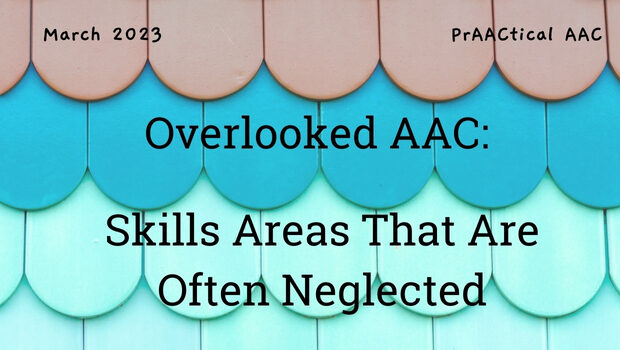Overlooked AAC: Skills Areas That Are Often Neglected

In last year’s series, Overlooked AAC, we explored a number of things that professionals often miss in providing educational and therapeutic AAC services. Today, we add to that topic, shifting the focus to skill areas that often get neglected.
AAC support generally focuses on communication, language, and literacy. When we look at the individual through a more holistic lens, though, it’s often apparent that there are other areas that create challenges for people with AAC needs. Here are some of them that we can impact in a positive way.
- Expand understanding of feelings and emotions: Our emotions go beyond the ‘primary colors’ of happy, sad, and angry, but when we lack the language to understand the other colors and hues, we limit our ability to develop emotional maturity. Language doesn’t just help us express our emotions; it also drives our ability to process and deal with them in healthy, productive ways. Teaching about these feelings, their nuances, and terms can go a long way to helping AAC users manage life’s challenges and celebrations in ways that enrich them.
- Facilitate self-awareness: Some AAC users benefit from support in understanding how our bodies function, the signals our bodies give us, what those mean, and how to take care of ourselves. Neurodiverse people may find this useful, but it may be important for other AAC users, too. In middle school, when her classmates were learning about their bodies, personal safety, and sexual health, Mia was pulled out for speech. She didn’t have the opportunity to learn the same things that her peers did, and no one ever thought that would matter. It did, and it does. We need to be more thoughtful about the opportunity costs in these situations, give increased agency to AAC users, and, at the very least, ensure that there is an alternate plan in place when content that is important to self-awareness is taught.
- Explore perspective-taking: Perspective-taking refers to the ability to understand out others perceive situations and make inferences about their emotional and cognitive responses (Gehlbach, 2004). This is a hard thing to do if you are neurodivergent and also when you have to consciously attend to things that others do not (e.g., swallowing your saliva, holding your head up, dealing with nystagmus). Problems with perspective-taking create difficulties with social relationships but also contribute to difficulties in academic and work settings and limit participation in community settings. There is much to gain by helping AAC users who have struggled in this area develop their ability to take the perspective of others in various situations.
- Teach a framework for decision-making: Making good decisions is another pivotal skill that impacts our ability to succeed throughout our lifespan. Eagleman (2011) and others suggest that in decision-making scenarios, our first ideas aren’t always the best ones to pursue. Helping AAC users understand this can be very useful. We can facilitate their ability to pause, reflect, and make conscious decisions about how to proceed.
- Build skills in attention: Attention is a multi-faceted construct and one that factors into most of daily life. AAC users are sometimes judged for having a ‘poor attention span,’ but little is done to help them expand their attentional capacities. They may have strengths or need support in one or more of these areas:
-
- Focused and sustained attention, which allows us to concentrate on one particular thing and stay attentive to that thing, requiring vigilance and persistence;
- Selective attention, which allows us to choose what we pay attention to and tune out distractions;
- Alternating attention, which permits us to shift our focus from one thing to another and requires significant mental flexibility; and,
- Divided attention, which gives us the ability to respond to multiple tasks or address different demands simultaneously.
These are developmental skills that can impact achievement and quality of life. When needed, these can be enhanced with therapy and instruction. Many AAC users develop skills in these areas without the need for specific intervention or additional resources. However, some who struggle with learning and life experiences would benefit from our support in these areas.
You can revisit earlier posts in the Overlooked AAC series through the links below.
References
Eagleman, D. (2011). Incognito: the secret life of the brain. New York: Pantheon Books.
Gehlbach, H. (2004). A new perspective on perspective taking: a multidimensional approach to conceptualizing an aptitude. Educational Psychology Review. 16, 3, 207-234.
Sohlberg, M. M., & Mateer, C. A. (2001). Cognitive rehabilitation: An integrative neuropsychological approach. Guilford Press.
Filed under: Featured Posts, PrAACtical Thinking
This post was written by Carole Zangari
